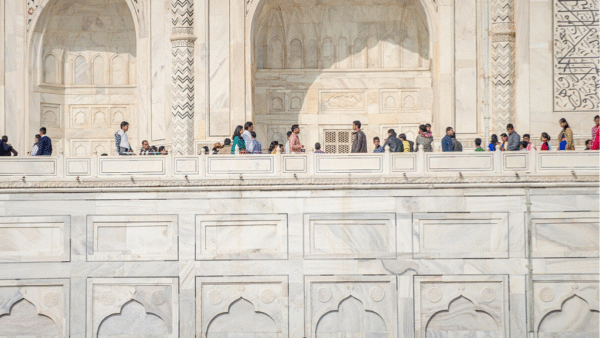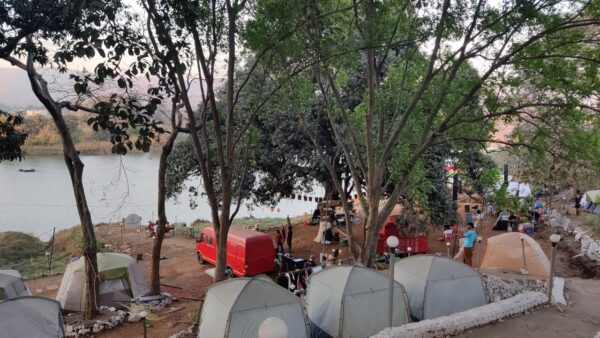The COP28 summit in Dubai was a conference with many “firsts” for health at a climate summit. It hosted the first-ever Health Day which emphasised the crucial link between climate change and health, it reinforced scientific evidence which identifies fossil fuels as a cause, it marked the attendance of health ministers along with those handling environment and finance which was heartening for many of us involved in the space. The intersection of health and climate change – one that should have been acknowledged years ago – has sparked hope that healthcare systems in countries, especially the developing ones with millions of vulnerable people in cities, will prepare their healthcare systems too to cope with climate change and that climate action plans will address the health aspect.
Crucially, a host of philanthropic organisations, governments, and multilateral development banks joined hands to send a clear and impactful message to policymakers by announcing $1 billion for climate and health initiatives.[1] It is not much but a beginning has been made. A part of it is earmarked for building community resilience and generation of “evidence and data required to support innovative approaches for climate adaptation at the local level – and address the critical intersection of climate change, health, agriculture, and gender” in the Global South, including India.[2]
The dedicated Health Day at COP28 elevated the political visibility of the intersection of climate and health, and went a long way to integrate health concerns into the global climate change agenda. It also underscored the urgency to examine climate actions through the health lens and consider health as a focus area while drafting adaptation or mitigation policies. And it helped to bring the focus on building resilient health systems that can withstand climate shocks.
India reels under climate-health impact
The year 2023 is the warmest year on record “as global mean temperature for the first 11 months of the year hit the highest level on record, 1.46 degrees Celsius (2.63 degrees Fahrenheit) above the 1850-1900 average.”[3] India saw extreme weather events almost every week from January to September this year in one part of the country or another. A report[4] by the Centre for Science and Environment (CSE) said the country experienced extreme weather on 86 percent of days from January to September.
Although India has seen a significant increase in extreme climate events and the inescapable impact on people’s health all these years, even through the nearly 30-year process of the COP, that health is not yet a priority can be deduced from the fact that the country did not have representation at the Health Day. The focus on health matters in the light of the fact that the Global Climate Risk Index[5] highlighted India as the seventh-most affected nation by the severe impact of climate change five years ago.
The repercussions have been severe, with numerous lives lost and millions adversely affected by extreme weather events, including heat waves, intense storms, floods, and droughts. These events have also led to substantial economic losses and property damage. In 2020 alone, climate-related disasters took a toll of 87 billion USD on India’s economy.[6] While the economic and property impact are counted, repercussions on health are not.
Escalating air pollution, its health, and economic impacts, is one of the most pressing challenges for India. In 2023, nine of the 25 most polluted cities in the world for PM2.5 levels (Particulate Matter) were in India.[7] Air pollution caused at least 1.6 million premature deaths in 2019.[8] In addition, “the economic loss incurred by air pollution in the country for that year 2019 accounted for 1.36% percent of the nation’s GDP.”[9]
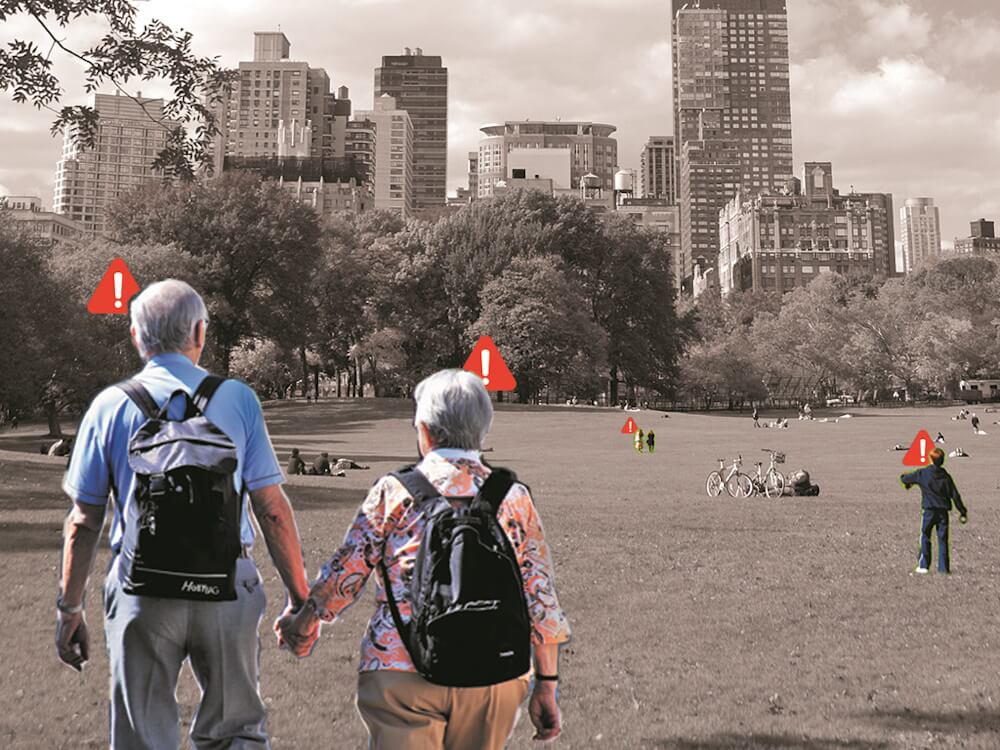
Illustration: Shivani Dave
Is India’s health infrastructure climate-ready?
This is the question governments, both at the centre and in states, should be asking themselves – and we, the people, should be asking of them. Hospitals are critical infrastructure in a community, especially during calamities, but our lived experience even in cities is that health facilities are often rendered useless during extreme weather events and cease to function when people need them the most.
This was validated by the study Global Hospital Infrastructure Physical Climate Risk[10] by XDI (Cross Dependency Analysis) ahead of the inaugural Health Day at the COP28. It highlighted that “without a rapid phase out of fossil fuels, one in 12 hospitals worldwide will be at high risk of total or partial shutdown from extreme weather events by the end of the century — total of 16,245 hospitals. And 71 percent (11,512) of high-risk hospitals by 2100 will be in low- and middle- income countries.”
Importantly, the report noted that India ranked at the top for the number of high-risk hospitals and that nearly 10 percent of hospitals may have to relocate or shut down due to climate change by 2100. “Today in India 2,700 of the country’s 53,473 hospitals are already at high risk of partial or complete shutdown from extreme weather events,” noted the report. This should shake our governments out of complacency.
From the long experience of working at the intersection of climate, health, and justice, and tracking the health system during and after major extreme weather events or crises, I can affirm that our current health infrastructure is not designed to cope with such multiple stressors. Let’s ask ourselves: Were we able to access healthcare for anything but COVID-19 during the lockdown?
There was no plan for patients with chronic illnesses, it was difficult to seek treatments such as chemotherapy, blood transfusions and dialysis, pregnant women and people with mental illnesses faced treatment interruptions, there were delays in diagnosis and essential drugs became unavailable as the entire system focused only on the pandemic. People’s desperate cries for hospital beds and life-saving oxygen lay bare the gaps in the healthcare system. The COVID-19 crisis was not the worst challenge. The intensification of extreme weather events, as projected, will burden the system more.
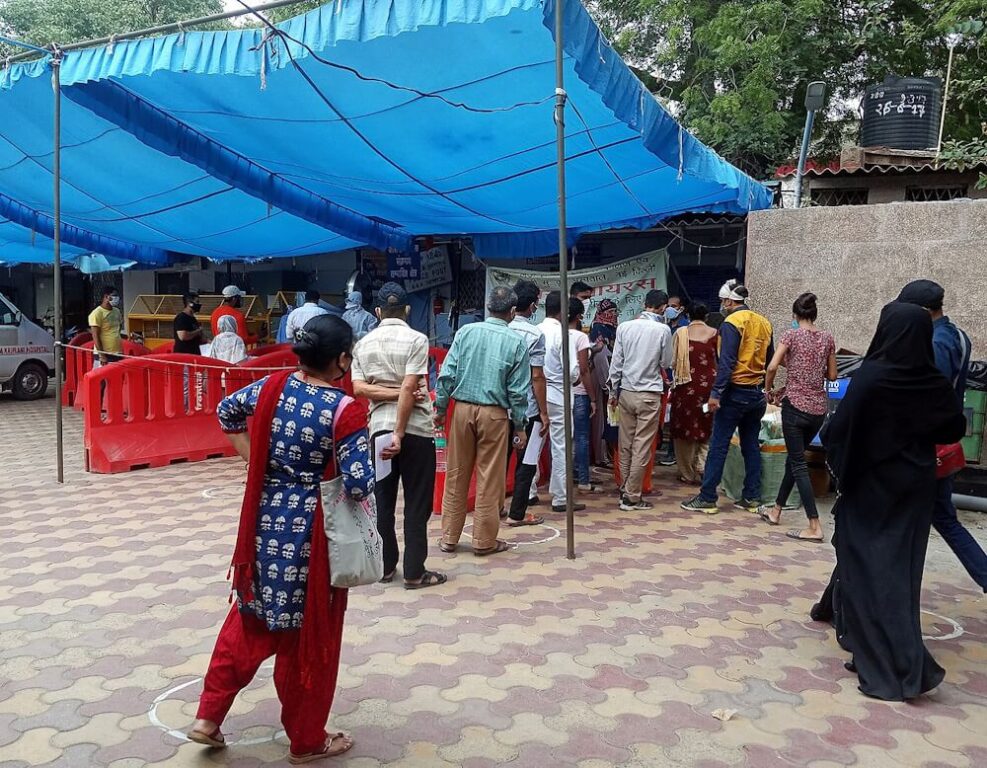
Photo: Sumita Roy Dutta/Wikimedia Commons
Addressing climate impacts
In the past few years, India has taken few significant initiatives, both at the national and sub-national levels, to build resilient health infrastructure and evolve a public health response to the climate challenge. At least, the plans are being made. In October 2018, India drafted its National Action Plan on Climate Change and Human Health (NAPCCHH)[11] to strengthen healthcare services to tackle the severe impacts of climate change on health. Subsequently, in February 2019, the union health ministry approved it under the National Health Mission (NHM).
The plan focuses on common Climate Sensitive Diseases (CSDs) caused by air pollution, heat, water, vector-borne diseases, and includes, cardiopulmonary, mental health, food-borne and nutrition-related illnesses.[12] The purpose is to create green and climate-resilient healthcare facilities and prepare detailed health adaptations plans. The central government is working with 23 states and over 100 cities and districts to develop and implement heat action plans.
Within this framework, India’s states are expected to formulate extensive state-level plans to tackle the health repercussions of climate change. These plans involve a commitment to enhance the existing health infrastructure and ensure preparedness. States are acknowledging the pivotal role of health workers to advocate actions that mitigate the impact of climate change on health, which calls upon training health workers, but the travails of anganwadi workers for salary and resources does not inspire confidence.
Under India’s presidency in 2023, the G20 acknowledged the pressing requirement to integrate the climate-health agenda and implement decisive measures across various sectors to safeguard human health, preserve natural ecosystems, and ensure the well-being of animals. The G20 New Delhi Leader’s Declaration[13] called for efforts to formulate specific approaches for healthcare systems that are low-carbon emitting, climate-resilient, and sustainable.
While the national initiatives look good on paper, the pace of their implementation leaves much to be desired. Ultimately, it is the healthcare infrastructure and climate resilience at the sub-national level, or in individual cities and towns, that will make the difference.
Solar-powered and flood-resilient health centres
An aspect of climate change and health infrastructure has been its design and climate-adaptability such as the solar electrification of health facilities now underway in 15 states. The Healthcare Scaling program[14] by SELCO Foundation, a non-profit, has implemented solar power solutions in more than 1,300 healthcare facilities. Chhattisgarh did this in more than 1,400 community health centres and has committed to achieving 100 percent solarisation[15] which could contribute to a reduction in carbon emissions.
Kerala is building flood-resilient health centres[16] to ensure people can avail services even during excessive rainfalls and associated calamities. Following the 2018 floods, the state government established the Rebuild Kerala Initiative (RKI)[17], envisioned as a participatory and inclusive process for a resilient and sustainable recovery and rebuilding of the state. It aimed at “higher standards of infrastructure for recovery and reconstruction, and to build ecological and technical safeguards so that the restructured assets can better withstand floods.”
The state health minister enrolled[18] the department’s officials in the UN-backed global initiative Race to Zero (RTZ)[19] in October 2021. This made it the first sub-national government in Asia to participate in the prestigious programme, underlining its commitment to achieving net-zero carbon emissions in alignment with the Paris Agreement goals. This commitment fulfills the health sector’s imperative to “first, do no harm” and also establishes a science-based target for reducing greenhouse gas emissions.
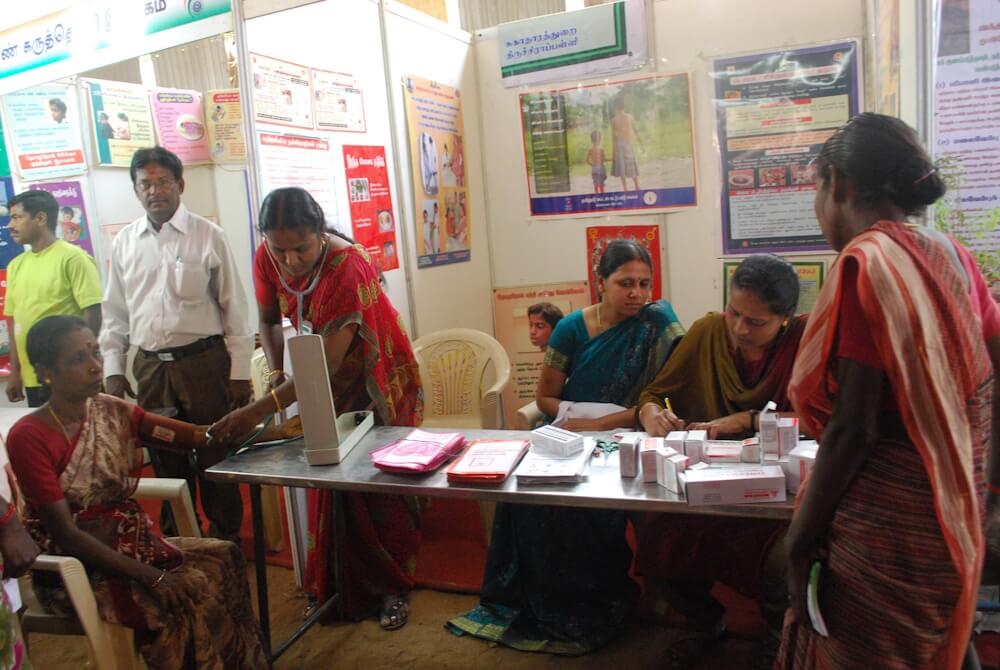
Photo: Wikimedia Commons
The need to integrate health and climate actions
It is strategically important for India to make health its topmost priority in climate planning and action. As climate change impacts intensify across the country in various ways, addressing the health needs of people becomes a part of facing the climate challenge, especially of the most vulnerable populations whose lives, livelihoods and health depend on climate-sensitive activities or are forced to work outdoors. Without deep work at the intersection of health and climate, India cannot ensure resilience, reduce disparities, and sustain people’s well-being.
The climate crisis has thrown a challenge at the health sector but it is also an opportunity to reimagine the role and expand the mission of healthcare. We need to re-envision a future where healthcare invests in local solutions like sustainable buildings and transportation, and climate-resilient cold chains that run on clean or renewable energy. Our healthcare should focus on supporting health workers and achieving green Universal Health Coverage. It should be designed to enhance the capacity of health authorities, from local public health departments to national ministries of health.
Strengthening health systems is not just about improving the physical infrastructure, it should be about community engagement and participation to ensure that no one is left behind. We should invest in community-based models of preventive care, primary health care, robust disease surveillance and information systems, and healthy food production to achieve health equity and climate justice.
The scale of challenges requires every city, town, and village to incorporate health in their climate planning. For that, India will have to significantly ramp up investment in public health, way beyond the paltry 1 percent of the GDP allocated now. Hospitals cannot be seen as places for just responsive care but also as the foundation for preventive care.
The health of the people is deeply interconnected with the health of the planet. It is impossible to imagine healthy people where the air is not clean, water is not safe to drink, and food is not nutritious. Therefore, we also need to frame policies that improve our environment and protect natural resources. India’s aspirations to be a world leader, or climate leader, require it to re-imagine its entire health system. Our health facilities should not only be climate-resilient and sanctuaries for communities but also, in a climate crisis, be the first to respond and the last buildings standing.
Shweta Narayan coordinates the Global Climate and Health Campaign for Health Care Without Harm (HCWH), an international NGO, in 81 countries dedicated to making health care available and environmentally sustainable. Her work focuses on providing legal, media and scientific research support to residents suffering from the effects of pollution and workers exposed to toxic chemicals. She also has worked with state and local governments in India to coordinate the input of health professionals in developing climate and environmental health policies.
Cover illustration: Shivani Dave


